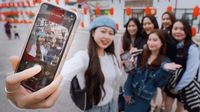In an age where traditional office jobs are being redefined, many young professionals are embracing the freelance lifestyle, seeking not only financial independence but also the flexibility to pursue their passions. This trend is particularly prominent among Generation Z, who are redefining work norms and consumer behaviors.
According to an article published on May 8, 2025, Tran Tra My, a 26-year-old former bank employee, made the leap from a stable office position to a freelance career, motivated by a desire for autonomy and entrepreneurial growth. "I wanted freedom but also knew I had to take care of myself," Tra My explained. Her journey began with a series of job changes—five in total—each aimed at building a robust network and gaining diverse experiences.
After six months as a freelancer, Tra My discovered that this path not only provided her with a satisfactory income but also allowed her to acquire valuable knowledge across various fields. "I plan to maintain my freelance career for at least 2-3 years," she stated, emphasizing her commitment to this new way of working.
In her content creation role, Tra My has also turned to artificial intelligence (AI) to enhance her productivity. "If I used to spend hours writing content and optimizing ads, now I just input my requests and let AI analyze customer data, suggest content, and even run marketing scenarios," she shared. This innovative approach has allowed her to balance her work and personal life more effectively.
Similarly, 27-year-old Le Phuong Anh transitioned to freelance work after feeling constrained in a corporate environment. "I used to feel quite restricted working in an office, so I chose projects that I loved and worked flexible hours, even making money while traveling," she said. Phuong Anh's previous job involved coordinating tasks, which left her feeling demotivated due to a lack of clear direction and declining benefits.
After a lengthy job search yielded no results, Phuong Anh decided to leverage her online work experience to sustain her income, diving into freelance advertising and media content production. Focusing on producing content for foreign clients, she has also begun developing her own TikTok and YouTube channels. "The income from freelancing isn’t as stable as when I worked in an office, but I still feel comfortable. Some months I earn three to four times my old salary," she noted, highlighting the potential financial rewards of freelance work.
Both Tra My and Phuong Anh acknowledge the benefits of freelancing but are not inclined to pursue this lifestyle indefinitely. They envision transitioning to management or long-term investments by the time they reach 40 or 45 years old. Tra My reflected on the challenges of freelancing, saying, "During this year’s Tet holiday, I struggled with expenses since I didn't have a 13th-month salary or Tet bonuses. Choosing to freelance also means I’m no longer covered by social or health insurance from a company, so I must manage my own benefits and file my own taxes."
This shift in work culture aligns with broader societal trends, particularly among Gen Z, who now make up about one-third of the global population, according to the United Nations. In the United States, the average annual income of a 25-year-old Gen Z individual is more than 50% higher than that of a baby boomer at the same age.
Meta, in partnership with BAMM Global, conducted a study to understand how brands can connect with this influential demographic, focusing on young people aged 18-24 in five countries: Brazil, Germany, Japan, the UK, and the US. The findings revealed that 67% of Gen Z users on Facebook and Instagram have shared video content with family and friends, with Instagram witnessing a significantly higher sharing rate than Facebook.
Meta noted that this behavior reflects a shift in user interaction, stating, "Sharing videos and memes has become a 'love language'—a way for Gen Z to express care for loved ones. They continuously seek content that resonates with their emotions, altering how they connect with brand content significantly."
Brands aiming to engage Gen Z should take note of this trend, as the generation actively seeks and shares content that is fun, positive, and useful. Additionally, the study found that 81% of Instagram users utilize the platform for personal development, learning new skills, and enhancing their financial and nutritional knowledge.
Furthermore, 73% of Gen Z believe that proactively personalizing content results in more relevant advertisements. The study emphasizes that strategic repetition of brand messages can significantly impact engagement, highlighting the importance of maintaining user attention on social media platforms.
Meta encourages brands to leverage various touchpoints to reinforce their presence in users' minds. "AI recommendations, short videos, and content from creators are changing how Gen Z discovers and connects with brands, making brand exploration a fun part of their online experience. About 78% of users stated they easily discover new products or brands through videos," the report concluded.
As Tra My and Phuong Anh navigate their freelance journeys, they embody the entrepreneurial spirit of Gen Z, who are not only reshaping the workforce but also redefining consumer habits. Their experiences reflect a broader trend where flexibility, creativity, and technology converge to create new opportunities in the evolving job market.
In a world where the traditional 9-to-5 job is increasingly seen as outdated, the rise of freelancing among young professionals is a testament to their desire for autonomy, creativity, and a balanced lifestyle. With Gen Z leading the charge, businesses must adapt to engage this dynamic and influential generation effectively.




